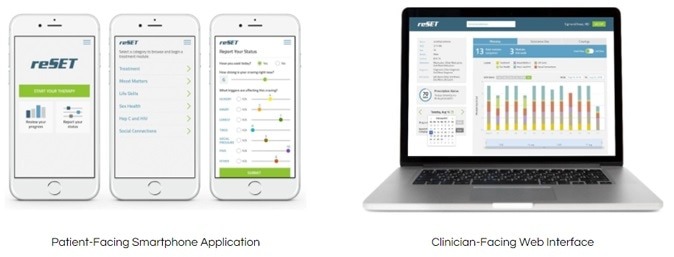Pear Therapeutics raises $80M; finds cost savings of $2,150 per patient with opioid use disorder
 Pear Therapeutics raises $80M in push for reimbursement (MedCity News):
Pear Therapeutics raises $80M in push for reimbursement (MedCity News):
Pear Therapeutics raised $80 million in funding, which it plans to use as part of a push for coverage of its digital therapeutics. The Boston-based company has three FDA-cleared products, including digital therapeutics for substance use disorder, opioid use disorder, and most recently, insomnia.
SoftBank’s Vision Fund 2 led the series D funding round. Several of Pear’s existing investors, including Novartis, also participated.
The startup develops software tools to be used either in tandem with or instead of medication … Pear has drummed up some interest from insurers and PBMs, including Hartford Financial Services Group, Fairview Health Services and RemedyOne, which cover its therapeutic for substance use disorder.
The company recently published real-world data on the efficacy of its therapeutic for opioid use disorder, in a 351-person study where most of the participants were covered through Medicaid. It also published data showing a reduction in spending of $2,150 per patient.
The Study on Cost Savings:
Real-world reduction in healthcare resource utilization following treatment of opioid use disorder with reSET‑O, a novel prescription digital therapeutic (Expert Review of Pharmacoeconomics & Outcomes Research). From the abstract:
- Buprenorphine medication assisted treatment (B‑MAT) adherence for opioid use disorder (OUD) is suboptimal. reSET‑O, an FDA-cleared prescription digital therapeutic, delivers neurobehavioral therapy (community-reinforcement approach+fluency training+contingency management) to B‑MAT-treated OUD patients.
- Methods: This retrospective claims study (10/01/2018–10/31/2019) evaluated healthcare resource utilization up to 6 months before/after reSET‑O initiation. Repeated-measures negative binomial models compared incidences of encounters/procedures. Net change in costs was assessed.
- Results: Among 351 patients (mean age 37; 59.5% female; 82.6% Medicaid), 334 had pharmacy claims and 240 (71.9%) received buprenorphine pre-/post-index (medication possession ratio 0.73 and 0.82, respectively; P = 0.004). Facility encounters decreased, with 45 fewer inpatient (P = 0.024) and 27 fewer emergency department (ED) visits (P = 0.247). Clinical encounters with largest changes were drug testing (638 fewer; P < 0.001), psychiatry (349 fewer; P = 0.036), case management (176 additional; P = 0.588), other pathology/laboratory (166 fewer; P = 0.039), office/other outpatient (154 fewer; P = 0.302), behavioral rehabilitation (111 additional; P = 0.124), alcohol/substance rehabilitation (96 fewer; P = 0.348), other rehabilitation (66 fewer; P = 0.387), mental health rehabilitation (61 additional; P = 0.097), and surgery (60 fewer; P = 0.070). Changes in facility/clinical encounters saved $2,150/patient.
- Conclusion: reSET‑O initiation was associated with fewer inpatient, ED, and other clinical encounters, increased case management/rehabilitative services, and lower net costs over six months.
News in Context:
- The FDA clears Somryst, Pear’s digital therapeutic to treat chronic insomnia
- A call to action: We need the right incentives to guide ethical innovation in neurotech and healthcare
- New report: Empowering 8 Billion Minds via Ethical Development and Adoption of Neurotechnologies
- Novartis dissolves agreement to market Pear Therapeutics’ prescription digital therapeutics for substance/ opioid abuse
- Pear Therapeutics raises $50M to develop and market a portfolio of digital therapeutics for mental health


